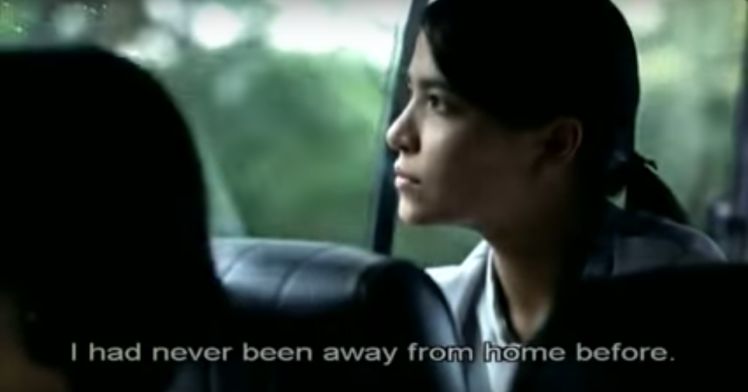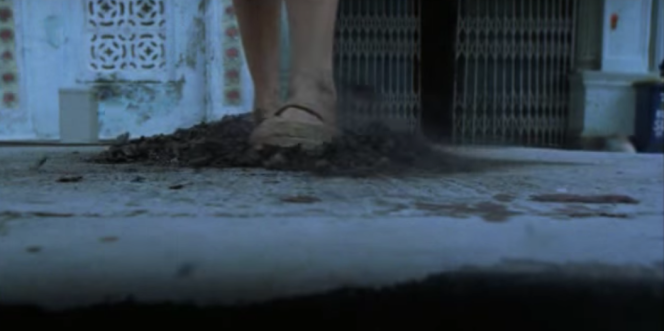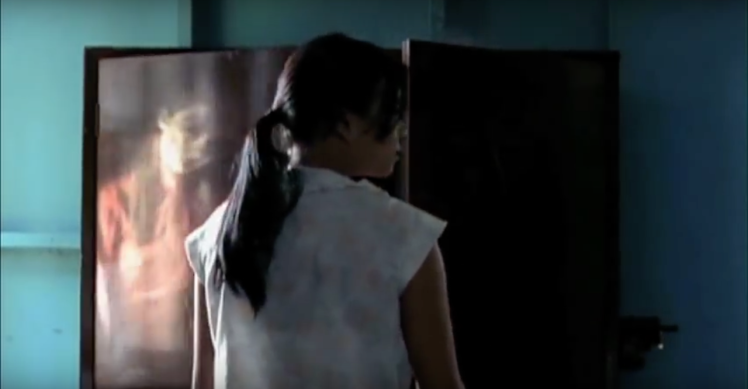Hey Plotters, I’m back with another film review! This time, I’m going to be reviewing the one genre I never touch – horror. More specifically, paranormal horror.
The Maid, 2005, (dir. Kelvin Tong) tells a tale of a young, innocent girl, Rosa Dimaano, who hails from the Phillipines sent to work as a maid in the cosmopolitan city state of Singapore to financially aid her ailing brother back home. She is warmly welcomed by Chinese opera troupe Mr. and Mrs. Teo and introduced to their friends and their mentally disabled son, Ah Soon. Knowing nothing of the Singapore culture, Rosa arrives at the worst possible time – the first day of the Seventh Month. In Chinese superstition, the seventh month of the lunar calendar is regarded as the month when the gates of hell open for forsaken spirits to walk the earth for 30 days. Having the audience see through Rosa’s eyes, we see her hell about to begin.

“ DIRECTOR’S STATEMENT
Maids.
They are seen all over Asia but they are rarely heard.
Working far away from home, these women toil day and night to earn a meager living, suffering many untold abuses.
Which makes them perfect as subjects for a horror film.
Horror films are built upon the pillars of isolation, unseen dangers and unspoken terror.
Maids are cut off from their loved ones, thrust into alien surroundings, expected to share a roof with strangers and then act as if everything is normal. It is an extraordinary predicament.”
It’s not that difficult to understand why The Maid was successful during its run at the local theatres, and have garnered international attention. An interesting thing about Singapore is that even though we live atop a glistening, modern metropolis, we just can’t sweep away (pun intended) the ashes of deep-rooted traditions. Ghost stories are told in abundant in secondary schools CCA camps, in Pasir Ris chalets, and in hawker centres where NS men gather after they book out to talk about their supernatural encounters. We’ve all heard whispers of “Don’t swim during the ghost month because something beneath the waters will drown you.”, “Don’t go home past 9 pm” and “Don’t step on the ashes on the pavements”, a rule that Rosa broke unknowingly. No matter how much our steel city grows under the sun before our eyes, nothing will fascinate us more than what we cannot see in the day.

Rosa steps on incense ash, a big taboo in Taoist culture.
In this post, we will delve into the technicalities of the horror genre, and how the narrative conventions apply to The Maid.
THE TWO MECHANISMS OF HORROR
The mechanics of the scares work on the generation of tension and pacing.
1. Not to show anything that could be normally regarded as frightening.
- nothing much seems to happen triggers the viewer to imagine a cause more horrifying than the director could show.
2. To wait: Another important mechanism of the horror film is to know when to create tension, or suspense, or shock at the various narrative and cinematic levels.
- The viewer expects something bad to happen but has to wait, which increases the sense of suspense and dread.
- Here, the marriage of sound and visuals is crucial, e.g., the use of sound effects or music, or of ominous silence.
In the film, I found that despite relying on the usual passing shadows, musical crescendos, creaking furniture, and close up fast cuts, the technique used never goes beyond that. For horror fans, this might be all but numb to them.

However, the twist at the end was unexpected, as Rosa uncovers the truth of her hauntings – her employers are the real demons instead. The previous maid before Rosa, Esther, the woman whose disfigured face haunts Rosa’s dreams at night, was set on fire by Mr. Teo. We find out that Rosa was hired mainly so the Teos could marry her to their dead son. This reflects director Kelvin Tong’s note on domestic helper abuse in Singapore. In a foreign land, no one would find out how Esther disappeared.
To conclude, although horror films can be analyzed in any number of ways, one interesting approach might be to ask, “What would the film be like without the monster?” In the case of The Maid, it seems clear that if you take away the cover story of a paranormal film, director Kelvin Tong attempts to examine the lives of foreign maids in Singapore. What rights do they have? What are Singaporean attitudes to these people? We may be attuned to the details of the horror plot, but these questions are lurking just below the surface.
Even though you won’t catch me dead in the cinema watching a horror film, The Maid shook me to the core when I first watched it as a child and now, some twelve years later. I will always support local films aside from Jack Neo and this is no exception.
APPRECIATIVE NOTES
- Language – While the Hokkien dialect is not foreign in local cinema thanks to Jack Neo movies, it was refreshing to hear the Teochew language being the lingua franca of choice in the film.
- Cinematography – As someone who deeply appreciates films shot entirely in Singapore, it was nostalgic to see places like Boon Keng back then, old hawker centres, and lush fields.
- Spirits that lurk in the day – an interesting to note as almost all horror films rely on the dark and shadows to create a sense of fear in the unknown, but some spirits were seen in bright daylight in full colour in the movie.
- A foreign heroine – Rosa was someone who had to stifle her fears and tears for her family in the Phillipines, and set to uncover the truth instead of hiding and doing nothing. In a country where the Chinese are privileged in our films and tv shows, and a decade before Ilo Ilo came out, a foreign female protagonist was a new and refreshing scheme.

This film sounds amazing – I need to see it. Love your appreciative notes by the way, beautiful cinematography really makes a film so much better for me. Maybe you would like to check out my latest blog post and tell me what you think, it is all about my top favourite foreign films – https://oliviasummergrace.wordpress.com/2017/05/14/my-favourite-foreign-filmstv-shows/
Hope to hear from you.
Olivia x
LikeLike
I love your analysis, can really tell that you did indeed studied film before. I find your entry incredible refreshing as many other bloggers did not appreciate this film as much as you did.
I agree with you on the point that the real demons were actually her employers! Sometimes the supernatural may seem like the horrifying ones when in actual fact humans are capable such heinous deeds, being such absolute monsters. Hence leading to the point of abuse, I concur that that movie might actually be trying to highlight the problem of domestic helper abuse in Singapore.
Overall great review!
LikeLiked by 1 person
Spectacular breakdown of an amazing movie. I thought it was a brilliant move on your part to bring up local ghost stories. It made it easier for me to relate to the film.
I also liked how you brought up the social issues with regard to domestic helpers in Singapore. It brings to light the suffering and hardships they go through, as I assume the movie tries to highlight.
I especially enjoyed your ‘Two Mechanisms of Horror’ part. It gave me, as a reader, a behind-the scenes look to the production of a horror movie, a chance to pick the director’s brain. Understanding the techniques directors employ in generating a scare gives us a greater appreciation for the craft.
Wonderful review, and always great fun to read your work. Keep up the good work, hope to see more in the coming weeks!
LikeLiked by 1 person